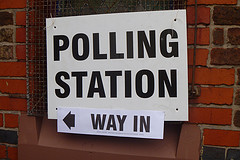Power and politics
by Michael

(Image by Pete on Flickr)
Less than a week to the UK General Election. I haven’t been thinking about it a great deal* – I know who I’m going to vote for in my constituency, and I believe in letting the votes be cast before futilely arguing over who should make a deal with whom to form the next government…
What has interested me is the perennial (or quinquennial) focus on voter apathy and the way politicians and celebrities (and people who are neither) exhort anyone who will listen to vote, to make a difference, to have their say. But voting in a General Election is not a powerful act. When I go to put an X on the ballot paper, it is not with a feeling of political influence coursing through my fingers and that stubby little pencil, it is more with a feeling like the one you get when you look at the picture made famous by Carl Sagan – the pale blue dot that is Earth, suspended in a sunbeam somewhere in the universe. It’s famously humbling, but also rather thrilling, in a way, to be so insignificant!
There are 64 million people in the UK, some 45 million or so of whom are eligible to vote (though far from all do, of course). My constituency alone has an electorate of some 75,000. One vote does not – should not – make “a difference” to the outcome. Those who decide not to vote because theirs will not be decisive in determining the outcome ask too much. It is, after all, the tallies of all our votes, the collective counts, not the individual Xs, that are the expression of democracy in an election.
Politics is not easy
Democracy is built on compromise. Whether it is holding your nose to vote at all, or choosing a candidate despite their party, or vice versa, or – for those who are elected – to give ground to your allies or opponents in order to make gains elsewhere. So for me, voting, and the majorities and minorities that it inevitably defines, isn’t really about influence or power, not at the level of the individual, anyway. Holding a vote lets you know (in theory, in a world without tactical voting, which I dislike**) how many people you have yet to persuade before you do get the right to exercise some democratic power (if only our politicians were more interested in persuading voters than pandering to them, though***).
Those who complain that voting is pointless and powerless have missed this point: it is not voting that gives power to the people, but rather it is opportunities to participate. If you don’t like the options on your ballot paper, and cannot bring yourself to compromise, it is both possible and incumbent on you in this democracy to create an alternative that you can stomach. Find others who agree with your politics, or persuade others that you are right. Persuade more people to join you, and you have a chance to find a candidate that you can vote for. It might even be you. If you can’t persuade people you are right, maybe you’re not.
Why vote?
Voting is a vital part of democracy, but not because it is de facto an act of democratic power. Voting can help you to know your own mind and to find out how many people agree with you (if everyone voted ‘honestly’). That’s important, but the implication is that to actually wield real democratic power, you must do more than cast a vote each time you are asked: you have to be active, engage with other voters, listen and argue with them, and perhaps compromise a little.
My vote is not going to change the world on its own. Nor should it. I still think everyone who is eligible should vote because it lets the rest of us know where we all stand. But if we want to exercise democratic power, we have to stop bleating about the pointlessness of voting and make an effort far greater than it takes to get to the polling station and write an X on a piece of paper.
So I would say vote precisely because it won’t alter the outcome, because it is ‘merely’ the reckoning. And if you actually crave the power to change this democracy, you will have to work for it and find it beyond the polling booth.
* Unlike Simon Kane and Tassos Stevens, for example, who have been thinking about the election most excellently, thank you very much…
** Of course, this is the problem, which is that the system has become a game and our politicians know how to play it and, if not how to win it, then at least how to stop other people from winning. Maybe we should change the system – but to one that doesn’t inherently advantage political machines (aka “parties”), please…
*** Naturally, this implies that I should try to persuade politicians to persuade me, but I’m not after power, and I’m not sure I’m right about any of this anyway…